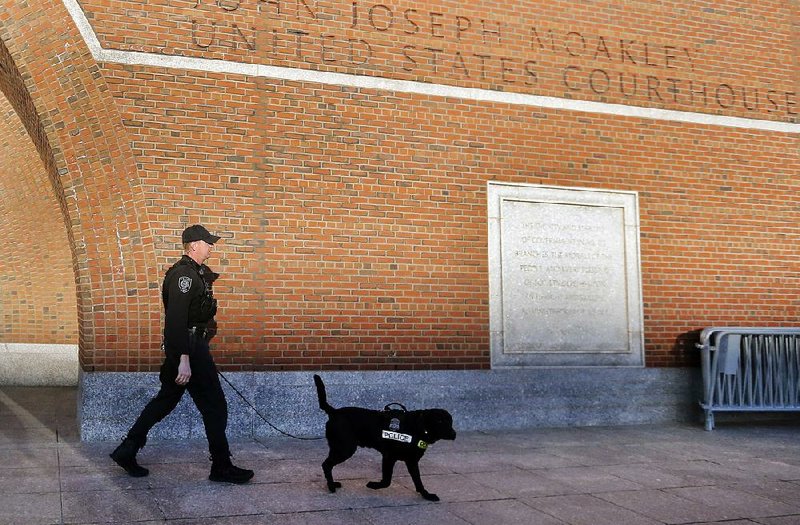BOSTON -- A U.S. district judge on Monday began the process of selecting a jury in the trial of Dzhokhar Tsarnaev, who is accused of planting bombs that killed three people and wounded more than 260 at the 2013 Boston Marathon.
Judge George O'Toole Jr. told the first group of more than 200 potential jurors not to search online or do any other research about the case, adding that if Tsarnaev were convicted on the most serious charges, the jurors would have to decide whether he is imprisoned for life or executed.
"Mr. Tsarnaev is accused of crimes potentially punishable by a sentence of death," O'Toole told the prospective jurors. If he is convicted of the crimes, the judge added, "it is the responsibility of the jury rather than the judge to decide whether Mr. Tsarnaev is sentenced to death."
The 1,200 potential jurors span the eastern half of Massachusetts. Because of the anticipated difficulties in picking a jury, the court has summoned a large jury pool.
The 12 jurors and six alternates who are selected will be part of one of the most high-profile trials in U.S. history.
The trial -- a federal death penalty case in a state that has abolished capital punishment -- could last four months.
Tsarnaev, 21, walked into the large jury assembly room at the federal courthouse in Boston and sat down at a table between two of his lawyers, Judy Clarke and Miriam Conrad, facing prospective jurors. Prosecutors sat at another table nearby.
Tsarnaev was not handcuffed, but he kept his hands together when he briefly stood, along with his lawyers, as the judge introduced them to the potential jurors.
He has pleaded innocent to a 30-count indictment, which includes conspiracy to use a weapon of mass destruction resulting in death. Seventeen of the counts carry the death penalty.
As O'Toole addressed jurors from a lectern between the two sides, he emphasized the gravity of the case and the obligations the jurors will have if selected. He is expected to speak to five more groups of jurors by Wednesday afternoon.
The prospective jurors must fill out a detailed questionnaire intended to weed out anyone with connections to the case, prejudices toward one side or the other, or severe hardships that would make jury service impossible.
After the last session Wednesday, the court will break until next week as both sides sift through the questionnaires and prepare more detailed screening questions. Seating the jury is expected to take three weeks.
In addition to barring the prospective jurors from researching the case, O'Toole ordered them not to discuss the case with anyone.
"This is a court order, willful violation of which may be punished as contempt of court," he said.
If a unanimous jury convicts Tsarnaev of any of the counts that carries a death sentence, the same panel would reconvene in a second phase of the trial and decide whether to sentence him to death or to life in prison with no chance of parole.
After two bombs exploded near the finish line of the Boston Marathon on April 15, 2013, local, state and federal law enforcement agencies began one of the biggest investigations since the Sept. 11 attacks. Within days, the FBI had identified two suspects, Tsarnaev and his older brother, Tamerlan, 26, and released photographs and surveillance video.
Police said that in the hours after the FBI bulletin on April 18, the suspects killed a Massachusetts Institute of Technology campus police officer, carjacked an SUV and engaged in a shootout with police in Watertown, Mass. A transit police officer was shot during that exchange but survived. Tamerlan Tsarnaev was killed.
After a manhunt that involved thousands of law enforcement officers, Dzhokhar Tsarnaev was captured April 19 in the backyard of a home in Watertown.
Members of Tsarnaev's defense team have sought to move the trial out of Massachusetts, insisting that their client cannot get a fair trial. They contend that the potential jury pool has been exposed to prejudicial news coverage and that virtually everyone in the jury pool is a victim of the attack because they were at the marathon, know people who ran in it or watched it, work at a local hospital or live in the towns locked down during the manhunt.
O'Toole has refused to move the trial, and the 1st U.S. Circuit Court of Appeals backed him. The judge has said he is confident he can find an impartial jury but that he would revisit the issue if jury selection proved otherwise.
A Section on 01/06/2015
28317200

